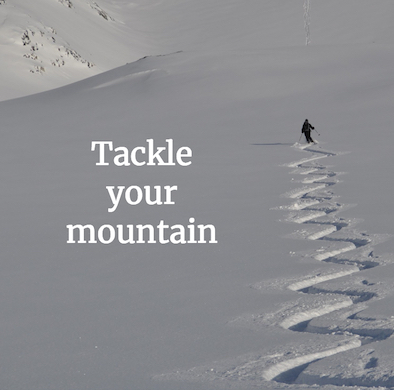 “A mountain is just a series of hills.”
“A mountain is just a series of hills.”
My father gave me that advice as I hesitated atop a particularly lengthy, mogul-filled ski run. Dad was a wonderful skier and my first ski instructor. He understood that standing atop that slope, I needed perspective and courage, not instruction.
A mountain is just a series of hills, strung together. I knew how to ski a hill or a short run, so I could do this.
Breaking difficult runs into segments gave me the courage to point the skis down the slope. I learned to pick a safe point beyond the first headwall to regroup and plan out what would happen next. Then I would visualize a plan to cover the ground between me and that point – plotting a course through the moguls or estimating how many turns to make on a steep headwall.
Instead of fearing what lay beyond, I focused on mastering the shorter stretch in front of me.
His advice stuck with me, resurfacing whenever I face a a larger challenge. It applies to many challenges in life, including writing.
Tackling the Big Writing Project
Many people have valuable information or great stories to share. But they hesitate to undertake such a long, difficult task with uncertain outcomes, and in hesitating miss the opportunities for personal growth that come from completing this kind of project.
Writing a book may seem like starting down a long, black-diamond ski run, particularly if you have never done it before. But it’s not an insurmountable challenge.
Writing a book is a series of manageable tasks, strung together with courage and fortitude.
A nonfiction book, for example, is the result of research, careful thought and analysis, planning, outlining, drafting, and revision. Taken individually, none of these activities is inherently dangerous, difficult, or daunting. You could figure any one of them out, given time and attention.
Fiction-writing processes vary: you may plot then write, or discover the plot through writing. You may wind back, abandon parts, regroup and reorganize. But still, it’s writing, word by word, hour by hour. You know how to do this.
Starting Isn’t the Hardest Part
The downhill skier benefits from gravity and urgency. You’ll reach the bottom of the hill eventually, even if you fall. And you can’t hang out on the slopes for too long without freezing over.
Writers can stop at any time. That’s both a blessing and a curse.
You can pause in the process to rest, refresh, or ask for advice and guidance. You can delay the writing when life intercedes, or change course with the book when a option opens up, like a skier spotting a more interesting trail partway down the mountain.
But it’s also easy – tempting, even – to abandon course partway through. From the midpoint, a book project can feel particularly daunting.
Halfway through, you may shudder at the scope of the draft remaining, or the amount of revision the work will take. You may start to question your writing, judgment, or sanity. And many people abandon their books, without reaching an end
But if you keep taking it one section at a time, eventually you reach the end, a different person than you started out.
What’s Your Mountain?
 What if you think of your book as your mountain, and have the faith to set out on it?
What if you think of your book as your mountain, and have the faith to set out on it?
You may not see the entire course from this vantage point, but you can pick off the terrain that lies ahead, the first chunk of the work.
Perhaps you can start with deep, intentional research, or freewriting on a topic. Your next step might be creating an outline, followed by drafting one specific section.
Divide the larger project into its component parts, and then start on the next logical step. As you go, keep track of where each step fits into the overall project, so you can track your progress.
Create Your Own Gravity
Commit to the project the way that a skier commits to the mountain – by pointing the skis down the fall line and getting going.
Give yourself some momentum.
Since you don’t have gravity, use other tactics to keep yourself going when the work is frightening:
- Set short-term goals as well as long-term ones
- Create a plan to meet your next short-term goal
- Let other people hold you accountable

The short-term goals are the key to getting your long-term plans done.
I apply my dad’s advice regularly when setting long-term goals.
At the start of each year, I have many annual objectives, but a year is simply too long and uncertain an interval to set concrete plans.
Who knows what will be happening a year from now?
But this next quarter – that’s something I can plan for and execute on.
How about you? What’s your mountain? Do you yearn to tackle a big project?
- What can you get done toward that project in the next quarter? The next month?
- Given that, what needs to happen next week?
Take a look at the next steps – those right in front of you. Short-term goals are the ones that get you out of bed in the morning. The whole project might seem frightening or huge, but this next part? You’ve got this.
